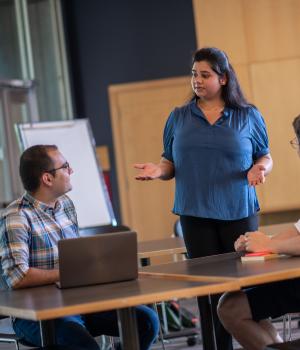Becoming and being a graduate student can be an exciting and overwhelming time, especially when you transition to a new place at the same time without your usual support network. If you are arriving from outside of Canada, it may also require you to try to get accustomed to a different set of cultural and academic practices you may not be used to.
It will be important to intentionally develop a healthy study/research/work-life balance, as being a graduate student is not only about academics. Your courses and research will be a major part of your daily routine, but health and recreation should not be neglected.
What's the difference between undergraduate and graduate Studies?
Graduate school is fundamentally different than undergraduate study. While specific differences may vary by program and discipline, here are some basic guidelines common to most graduate programs:
UNDERGRADUATE
Breadth over depth
Recipient of knowledge
Externally directed
Outside of the field looking in
Heavier focus on memorization of facts
Larger class size
GRADUATE
Depth over breadth
Analyzer and creator of knowledge
Self-directed, more independence needed
Inside of the field looking out
Focused on application and critical analysis
Smaller class size
Based on these high-level differences, you can expect that your reading load will be intensive, you will be expected to participate in in-depth discussions and your week may include sustained work in reading, writing, preparing presentations, developing scholarship or grant proposals, library or lab research and the like.
Depending on the type of program you are in, other differences may apply.
COURSE-BASED
A set number of courses from core and elective modules
Final project, capstone, or graduating paper
Similar to undergraduate, more directed and structured
THESIS-BASED
In-depth research
Thesis/dissertation component
Some coursework, usually in the early years
In thesis-based programs students will work closely with a faculty research supervisor to develop their research topic. Professors will expect students to take charge of their own educational path and ask for guidance when they need it. We recommend the supervision information for further information.
YOUR RESPONSIBILITIES AS AN ACADEMIC
Your responsibilities as a peer
Peer support can be a major contributor to your success. Make sure to participate in opportunities for networking with faculty and colleagues, within your program and department as well as across academic disciplines, that you can potentially be working and collaborating with for many years to come.
Contribute to a respectful environment
A respectful, inclusive environment, without assumption from someone’s appearance or experiences allows for a comfortable space where learning can occur.
Be proactive
Your success in grad school depends on you. That includes being your own manager of your degree—Look for (or create) opportunities to help you get what you want from grad school
First-name basis
Many supervisors and other faculty prefer if you addressed them according to their first names. It’s always wise to check first/let them initiate how they would like to be addressed.
Plan for success - Grad Game Plan
Grad School provides many opportunities to you and it requires you to become an active steward of your own success by deciding to actively participate, network and take accountability for your time and how you spend it. You will need to understand your program requirements and reach out to your program directly if you are unsure about expectations as many requirements and processes are program-specific. Each program has a dedicated program staff (a non-academic employee) who can support students in understanding administrative procedures and a program advisor (an academic faculty member) whose role it is to provide support with regard to academics, such as course choice, supervisory relationship issues etc. Make sure you are aware of these contacts in your program.
Learn more about what to consider at each stage of your program by reviewing the Grad Game Plan!
Taking care of yourself
Your health and wellness are important during grad school. Taking care of yourself will help you thrive during the stressful moments of your graduate studies. This includes more than just your physical health, but also mental and social considerations.
Grad school can be tough! Everyone is on their own path, with a variety of non-academic responsibilities, and there is no shame in lowering your course load for the semester. It’s important that you prioritize your mental and physical health if you are feeling overwhelmed. Keep up to date with wellbeing events directed at graduate students if you need to learn how to develop healthy habits. We encourage you to reviewHealth, Wellbeing and Safety resources.
The Health Plan Premium Assistance Fund from the Graduate Student Society (GSS) can provide partial or full reimbursements for the AMS/GSS Health & Dental Plan.
Student groups
Check out some of our various student groups that you can utilize to become more connected with the UBC community. We have hundreds of clubs and student organizations you can choose from, you're bound to find something that meets your interests!



